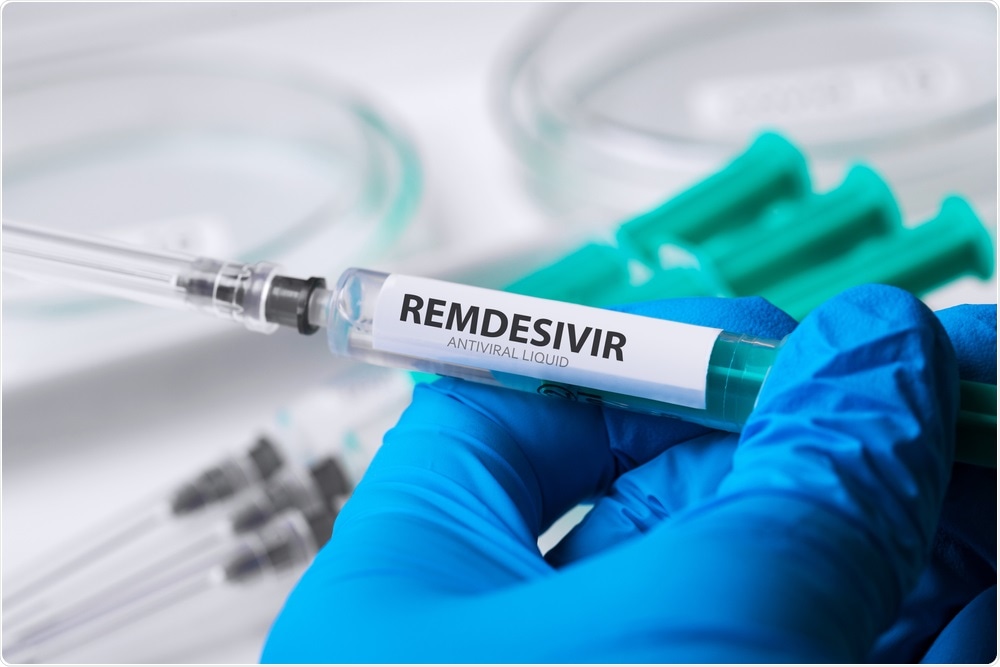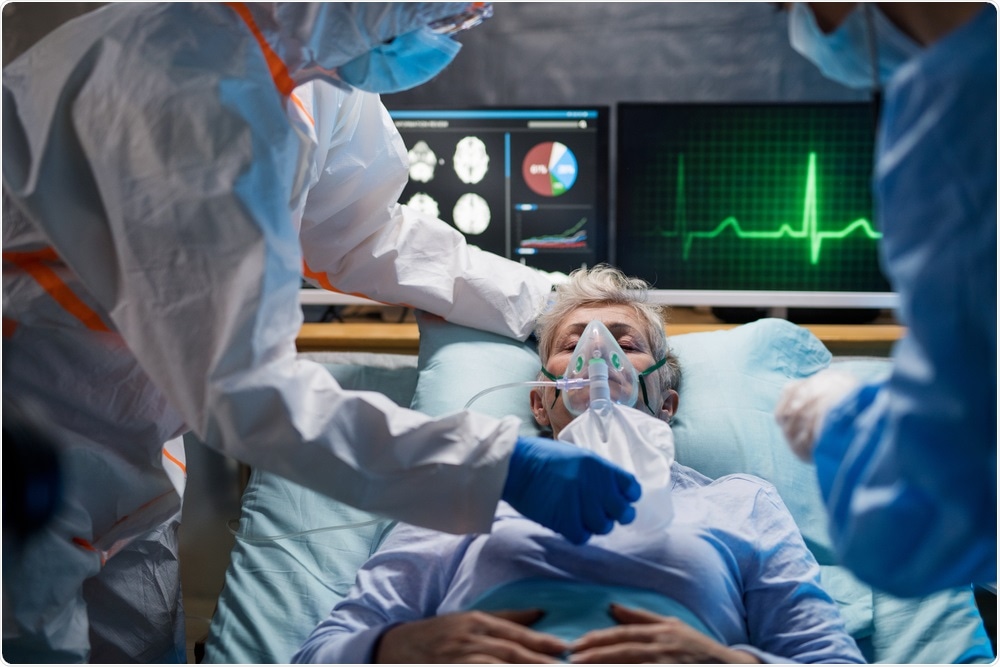As the coronavirus disease 2019 (COVID-19) pandemic spread invisibly over the world, frantic attempts were made to identify new or repurposed drugs that would help these patients recover from their infection with the severe acute respiratory syndrome coronavirus 2 (SARS-CoV-2).
Among these drugs includes remdesivir, which is a broad-spectrum nucleoside analog that was originally developed by Gilead Sciences, Inc. during the previous SARS outbreak of 2002. More recently, remdesivir was approved for use in COVID-19 patients over the age of 12 and has since become a routine part of therapeutic protocols for treating severe COVID-19.
The decision to incorporate remdesivir into the treatment of severe COVID-19 cases was originally based on a review of evidence gathered by the National Institute for Health and Care Excellence (NICE). A new preprint analysis of current data, which is yet to be peer-reviewed, indicates that remdesivir does not show efficacy in regulating the severity of the illness.
 Study: Evaluation of the effectiveness of remdesivir in treating severe COVID-19 using data from the ISARIC WHO Clinical Characterisation Protocol UK: a prospective, national cohort study. Image Credit: Tobias Arhelger / Shutterstock.com
Study: Evaluation of the effectiveness of remdesivir in treating severe COVID-19 using data from the ISARIC WHO Clinical Characterisation Protocol UK: a prospective, national cohort study. Image Credit: Tobias Arhelger / Shutterstock.com

 *Important notice: medRxiv publishes preliminary scientific reports that are not peer-reviewed and, therefore, should not be regarded as conclusive, guide clinical practice/health-related behavior, or treated as established information.
*Important notice: medRxiv publishes preliminary scientific reports that are not peer-reviewed and, therefore, should not be regarded as conclusive, guide clinical practice/health-related behavior, or treated as established information.
Remdesivir mechanism of action
Remdesivir is a prodrug that is given intravenously and is activated by the patient’s metabolism. As an adenosine nucleotide analog, remdesivir incorporates itself into the ribonucleic acid (RNA) genetic material of SARS-CoV-2. Once here, remdesivir acting like a wrong part in a machine by stalling the viral RNA-dependent RNA polymerase (RdRp), which is essential for viral replication.
Study rationale
Since RdRp is a highly conserved enzyme, remdesivir has the potential to arrest the replication of many other coronaviruses including the SARS-CoV and the Middle East Respiratory Syndrome Coronavirus (MERS-CoV).
In vitro studies have shown that remdesivir could effectively neutralize SARS-CoV-2 at a half-maximal effective concentration (EC50) below 5 micromolar (µM), all the maintaining a high safety margin. This accounted for its early deployment in the present pandemic.
Similarly, In vivo trials in animals also showed beneficial effects; however, there are known limits to the extrapolation of animal data to humans. This is particularly true when mice are used, as there are serious differences that exist between human and mouse pharmacokinetics and the clinical course of SARS-CoV-2 infection in these two species. Moreover, remdesivir pharmacokinetics have been reported only from trials in healthy adults, rather than from severely ill patients with COVID-19.
Based on an important clinical trial referred to as ACTT-1, the current study focused on patients who were most likely to benefit from the use of remdesivir. All patients were at clinical level 5 on a scale from 0 to 8 and, as a result, required hospitalization.
Follow-up on these patients continued for 28 days after either their hospital admission or positive COVID-19 test in both groups. Whereas one group of patients received remdesivir, the other did not. All patients had a confirmed SARS-CoV-2 infection, required oxygen supplementation at some point within 24 hours of the start of the study, and were put on remdesivir (in the first group) within the same period.
What were the findings?
Both groups were given standard of care treatment. However, the remdesivir group was more often given to younger patients who did not have severe underlying illnesses and were not immediately admitted to the intensive care unit. The patients who received remdesivir were more likely to be obese and were more likely to also receive dexamethasone or antibiotics.
As compared to 62% of controls, 94% of the remdesivir group were on dexamethasone. Similarly, 90% of the patients in the remdesivir group were also administered antibiotics, which was comparable to 80% of the patients in the control group. Since about 10% of patients received at least two types of steroids, the differential use of steroids influenced the difference in outcomes between the two groups.
Complications
About 62% of the patients had viral pneumonia, whereas over a tenth of these patients had bacterial pneumonia. Viral pneumonia was more frequent in the remdesivir group and accounted for 75% of patients in this group, which was comparable to 58% of controls who also experienced this complication of COVID-19.
The incidences of elevated blood sugar levels, acute kidney failure, anemia, and acute respiratory distress syndrome (ARDS) were similar in both patient groups. Notably, hyperglycemia was twice as common in the remdesivir group, at 18%.
 Image Credit: Halfpoint / Shutterstock.com
Image Credit: Halfpoint / Shutterstock.com
No significant reduction in deaths
Within 14 days, almost the same proportion of people died in each group, whether or not they were treated with remdesivir, at 9% and 12% for the remdesivir and control groups, respectively.
After the first eight days of treatment, the median time to recovery was lower in the remdesivir group by one day. For every 36 patients treated with this drug, one death may have been prevented. However, this association is not strong when associated with disease severity.
Non-invasive and mechanical ventilation, as well as the use of extracorporeal membrane oxygenation (ECMO), were all more frequent in the remdesivir group. More than 66% of patients, irrespective of group, improved by day 15.
What are the implications?
The use of remdesivir failed to reduce 14-day mortality rates as compared to controls. The researchers believe that further analysis of the data by subgroups may show specific drops in mortality in some cases.
This trial included participants from various parts of the United Kingdom; however, a majority of the test subjects were white males. Additionally, the participants were of all ages; however, there was a greater number of people from older age groups than the earlier ACT 1 and SOLIDARITY trials. The increased median age should be adjusted when comparing the results discussed here with those published in earlier trials.
The uncertainty surrounding the uneven distribution of complications, such as viral pneumonia, could have confounded the ability to accurately assess the effects of remdesivir in this study. The high incidence of these complications is coupled with the higher use of steroids in the remdesivir group.
For instance, was viral pneumonia already present when the patient entered the study? Was it an indicator that the patient was already sicker at hospital admission? Was it the result of remdesivir treatment?
These questions need to be answered, along with the reasons for the increased number of patients with ARDS and the higher use of non-invasive ventilation in the remdesivir group. This could signal a bias towards giving more care to these patients. Alternatively, it could mean this group was sicker at admission.
Almost 75% of patients on remdesivir were excluded from the study because the drug was initiated more than 24 hours from the start. This criterion helped fix the baseline level of severity of COVID-19 in this cohort.
Perhaps the early administration of remdesivir might have been more helpful, as it would have counteracted the replication of the virus in the lungs when it would be expected to be at its peak. In an earlier non-human primate experiment, the authors emphasize the importance of treating humans as early as possible, which was underlined by the results of the ACTT-1 trial.
This could not be studied here, as the group contained too few patients with hospital-acquired COVID-19, who would have received early treatment. Though liver abnormalities were detected in the remdesivir group, nothing more could be determined from the data available here.
“Overall, our study does not provide evidence that remdesivir is of benefit in patients hospitalised with severe COVID-19.”

 *Important notice: medRxiv publishes preliminary scientific reports that are not peer-reviewed and, therefore, should not be regarded as conclusive, guide clinical practice/health-related behavior, or treated as established information.
*Important notice: medRxiv publishes preliminary scientific reports that are not peer-reviewed and, therefore, should not be regarded as conclusive, guide clinical practice/health-related behavior, or treated as established information.